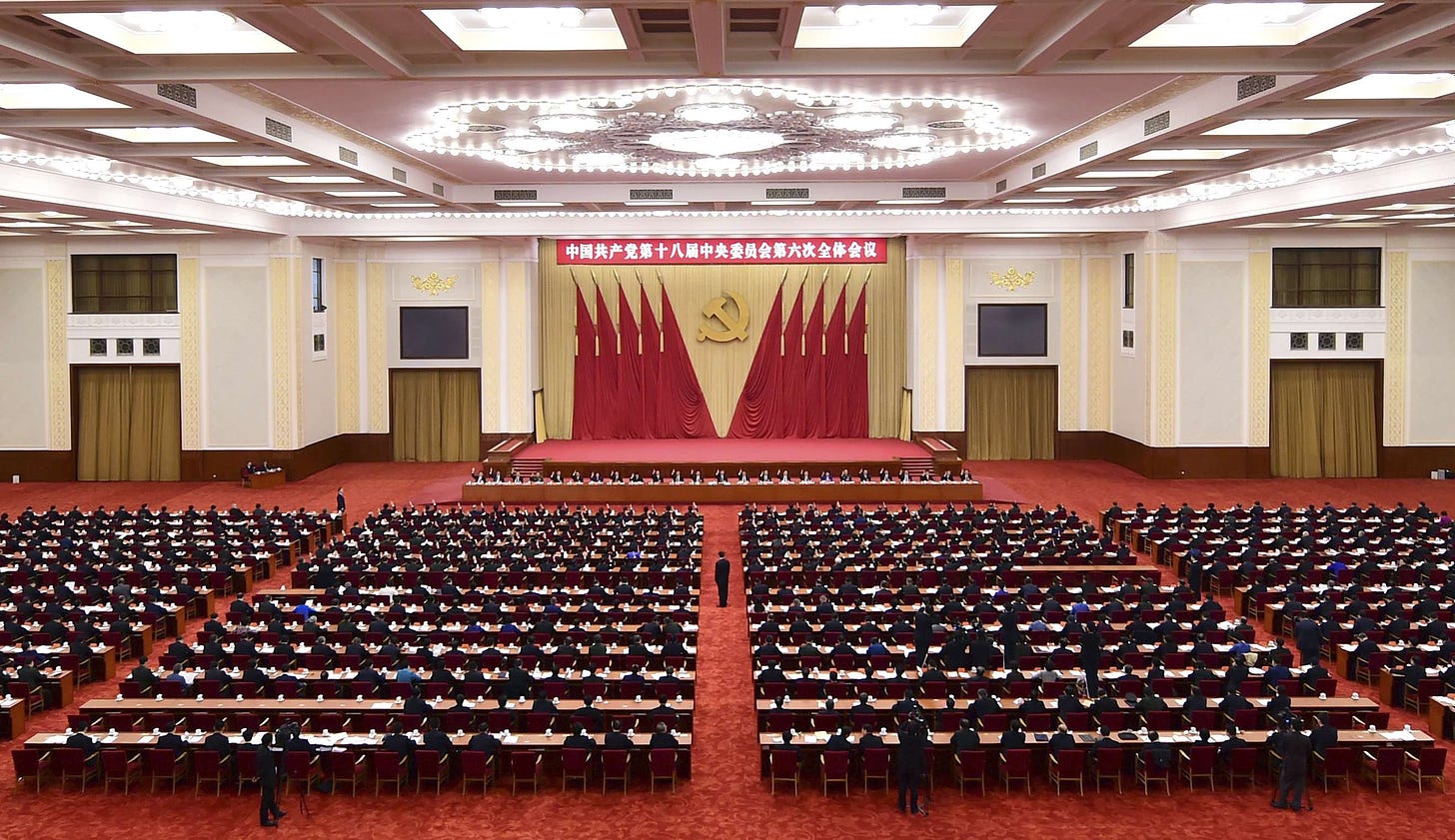Badlands Media will always put out our content for free, but you can support us by becoming a paid subscriber to this newsletter. Help our collective of citizen journalists take back the narrative from the MSM. We are the news now.

It sounds like the name of a horror movie. Except, menticide isn’t the latest Hollywood slasher flick; it’s a tool for social control.
In the second installment in this two-part series, the most important target to conquer a people will be revealed.
(In case you missed it, here’s the first installment: Triggering Mass Psychosis.)
Using a traumatic event to break a person, group, or culture, from their connection with reality is the goal. It forces social change—change that isn’t in alignment with freedom and the rule of law.
Why is breaking the connection with reality important? How does this help the parasitic elite conquer and maintain control?
The answer has to do with where morality comes from and how it acts as a hedge against tyranny.
Erosion of Values
In the past, religion was the primary weapon of choice; state religion acted as mass media, education, the justice system, and cultural center. Today, these formally centralized aspects of society broke off into now secularized branches, which are, ironically, a lot easier to induce into mass psychosis due to their compartmentalized makeup and a thoroughly morally blinded and ethically illiterate membership.
Secular atheistic ideologies and cultures are susceptible to mass psychosis more so than religion-centric cultures because of moral relativism. Let’s consider why.
As dysfunctional as some religions have been and are, they are some of the only social institutions left that are founded on the concept of objective morality.
Objective morality argues that right and wrong are real, and this can be measured just like other real things in the material world.
Moral relativism argues that morality is subjective, based on the beliefs of the individual or group. It’s an arbitrary based system that favors one group so it can dominate another (Phallogocentrism as a basis for Marxism.) And since it’s just a choice of one group using force to gain dominance, another system can be imposed to replace it, also by force. This is the basis of communism as it gripped the East (Russia and China.)
History bears this out.
Before the Bolsheviks took over Russia, it was a highly religious society with a clear sense of morality and ethics—albeit one that had its problems, to be sure. But when Vladimir Lenin and his ilk gutted Russia’s moral foundation by popularizing secular atheism and Marxism, horrors we can barely imagine were unleashed: genocide, rape, torture, and depriving the people of property were now justifiable, even necessary for the communist utopia.
Because a religion explicitly defines what is good and bad, what is valuable and what is not (e.g. the Golden Rule, the 10 commandments, etc,) it acts as a conscious and measurable guide for human behavior. For instance, a person grappling with the question of whether they should steal from their neighbor reflects on the 10 commandments, and use reason and logic, to a certain extent to conclude that the best choice is not to steal. But without a socially reinforced guide, the moral evaluation sinks below the surface of consciousness, where reason and logic have much less power. Moral thinking ceases to be objective and becomes subjective. In this situation, social mood and whims combined with the desire to fit in (to avoid the fear of missing out) steer the masses into collective psychosis with greater ease and to the great benefit of the elite groups pushing for mass psychosis.
In simple terms, if a person doesn’t consciously know the principles of right and wrong, harm vs. righteousness, then they have no yardstick for measuring good and bad behavior.
‘Wait! If religions are centered around God, how can they be used for mass psychosis? Morality and religion go hand in hand!’
While it is true that all major religions use objective moral systems, the way the people interact with a system was and still is largely out of their hands. You have to think about a moral rule and how it should be applied in a situation to be in the driver’s seat of objective morality; this is what ethics is all about.
Ask yourself: how many people grapple with more questions on a regular basis? Are we taught how to think about ethical questions? It’s usually only a minority, with most people doing whatever they are told by the alleged moral experts. For this reason, if the moral core of religion—the priest class—becomes corrupt in some way, it can derail an entire religion and culture anchored to it. We don’t live in a spiritually enlightened world where everyone makes it their personal mission to master moral questions.
What’s more, we have the problem of what we might call satanic groups infiltrating our religious and social institutions. The Sabbateans and Frankists of the 17th and 18th centuries—the same people who went on to form the Bavarian Illuminati in 1776—used infiltration to corrupt society. They literally weaponized sin, which you can read about in researcher and anthropologist Robert Sepehr’s book 1666 Redemption Through Sin.
The situation can be boiled down to, who is keeping watch? If the experts say that X is the right thing to do, and the people just blindly follow what the experts say, is that a real and effective system of morality?
In the past, most people were illiterate, and if they could red, they weren’t allowed to read the bible. This was for the priest class to do. The priest class acted as intermediaries, deciding what to tell the people and how to interpret sacred texts. This system was used to inaugurate wars like the Crusades, justify colonial conquest and to prosecute heretics. Anyone who didn’t totally conform to what the official priest class declared as a religious doctrine was a threat. And as many modern-day Christians know, the actual teachings of scripture tend to go against the historically justified murder, enslavement and conquest of the imperial church.
So what happened?
It’s the same problem we face today. A moral system might be perfectly described, and written in crystal clear language. But as soon as critical thinking is removed from the equation, it becomes just another set of rules in the hands of a bureaucracy—ring leaders that tell everyone else what to do. In effect, moral illiteracy is the real problem. Even if you can read a sacred text with perfect morals, do you know how to make sense of it and apply it to life?
As an example of the disorienting power of removing an explicitly-defined value system from society (usually held in place by religions,) let’s look at the transgender ideology.
It argues for the psychotic view that there is no gender, no male or female, outside what we decide for ourselves—no objective truth. And based on this belief, they prescribe mass conformity to self-declared gender identities, combined with the indoctrination of the whole of society, to include castration, mutilation and fetishization of children and pubescents. Clearly, this is a mass psychosis. In nearly all cases, those who subscribe to the trans ideology have no moral compass or no clear concept or system of the principles of truth, right and wrong.
Of course, history shows, religions are hardly immune to mass psychosis. As a matter of fact, religions are some of the best places to see historical examples of mass psychosis. There are at least two dozen plus cultures that practiced some form of religious child sacrifice in antiquity. However, it’s not the religion itself that acts as a safeguard or the primary corrupting agent; it’s a consciously defined set of principles of right and wrong, real and logically approachable morals and ethics. They have to be enumerated, definable and namable to have any guiding power for the individual and group.
Don’t get me wrong. I’m not saying religions are the problem, or on the other hand, some magic fix.
Religion is a social institution; all social institutions are vulnerable to social contagion and mass psychosis when that social group’s value immune system stops working.
The Value Immune System
A value immune system for a social group, or individual, is when ideas are carefully discussed, analyzed and evaluated against the accumulated body of objective morals and ethics present within the culture. Morals and ethics evolve and improve with each ethical question debated, just like your immune system grows stronger and wiser as it is exposed to the environment.
Where do values, morals, and ethics come from? Is there a clear source and therefore clear answer as to what is truly right or wrong?
The source of rights, morals, and ethics (A.K.A. virtuous or divine values) is God, or as the founding fathers put it, “We hold these truths to be self-evident, that all men are created equal, that they are endowed by their Creator with certain unalienable Rights …”
This is a critical point that is often dismissed by secularists or atheists as religious dogma or nonsense.
But the fact is, there is no other valid theory of where rights and values come from, other than God. In this case, God is the philosophic singularity from which all categories emerge and unite—an ontological singularity (simplified below.)
The most brilliant atheists in history were never able to come up with another theory of where rights and values come from. Ironically, they ended up arriving at a similar conclusion as theists. Secular humanism is the name for atheistic morality. In this system, objective truth is where rights and values come from, termed universally preferable behavior or mutually agreeable rights and values. In substance, whether you say God is where rights and values come from or the truth, conceptually, they are the same.
In more simple terms, since God, as a concept, is the source of all ideas and values, then rights must come from God as well. And since God is the source of all goodness and perfection, then if we have accurately identified God-given rights and values, when we use them in society, we should also see goodness and progress toward perfection. As it turns out, this is exactly the case. We can cite the United States as a successful example of a society that anchors itself to a legal, moral and ethical system founded on objective morality and theism. But as the founding fathers wrote about, this experiment we call the American Republic will fall into corruption if WE THE PEOPLE forget how to think critically about rights, freedom and the ethics required to keep it going.
Industrial-grade mass psychosis in the form of communism requires a) the destruction of true spiritual connection (the basis of real morality and ethics) along with b) the deliberate dumbing-down of the population. Once this cultural degradation has occurred, the population is easily convertible into a mass mob, with no ‘true north’ or moral compass to guide it.
The secularization of society—the removal of active philosophy and theism—is well underway in the Western world. As a clue, evaluate Hollywood media and ask yourself how much religion, theism and questioning of secular authority are present as morals in the stories.
The Rape of the Mind: Menticide

Mass psychosis has been induced many times throughout history, which is why certain leaders are obsessed with muddying and even erasing our understanding of history.
As psychoanalyst Joost Meerloo explains in Rape of the Mind:
“It is simply a question of reorganizing and manipulating collective feelings in a particular way.”
The general method by which this can be accomplished is called “menticide”, the etymology of this word being “a killing of the mind.” Meerloo further explains:
“Menticide is an old crime against the human mind and spirit but systematized anew. It is an organized system of psychological intervention and judicial perversion, through which a ruling class can imprint their opportunistic thoughts upon the minds they plan to use …”
Priming a population for the high crime of menticide begins with the sowing of misplaced fear and rage. A particularly effective technique to accomplish this is by employing “waves of terror.” Through the application of this technique, the sowing of fear is staggered with periods of calm, but each of these calm periods is followed by the manufacturing of an even more intense spell of fear, and on and on the process goes, or as Meerloo writes:
“Each wave of terrorizing creates the effects more easily – after a breathing period – more easily than the one that preceded it because people are still disturbed by their previous experience. Morality becomes lower and lower, and the psychological effects of each new propaganda campaign become stronger; it reaches a public already softened up.”
Meerlo also had a few things to say about the technological aspect of this practice:
“Modern Technology teaches man to take for granted the world he is looking at. He takes no time to retreat or reflect. No rest, no meditation, no reflection or conversation. The senses are overloaded with stimuli. Man doesn’t learn to question his world any longer, the screen provides all the answers.”
There is a further step that these would-be totalitarian rulers take to ensure the success of their programming, and that is to isolate the victims and disrupt normal social interactions. When alone and separated from friends, family and coworkers, an individual becomes far more susceptible to delusions for several reasons.
Was this the intention behind lockdowns and quarantine? And has modern technology, cell phones and social media made us more or less connected over the years?
As Meerloo explains, in regard to physiologist Ivan Pavlov’s work on behavioral conditioning:
“Pavlov made another significant discovery: the conditioned reflex could be developed most easily in a quiet laboratory with minimum disturbing stimuli. Every trainer of animals knows this from his own experience; isolation and the patient repetition of stimuli are required to tame wild animals. The totalitarians have followed this rule. They know that they can condition their political victims more easily if they are kept in isolation. Alone, confused, and battered by waves of terror, a population under an attack of menticide devolves into a hopeless and vulnerable state.
The never-ending stream of propaganda turns minds once capable of rational thought into playhouses of irrational forces, and with chaos swirling within them and around them, the masses crave a return to a more ordered world.
The would-be totalitarians can then take the decisive step, they can offer a “way out” and a return to normalcy, at a price. The masses must relinquish their capacity to be self-reliant individuals who are responsible for their own lives, and become submissive obedient subjects.”
Reason and common human decency become scarce; there is only a pervasive atmosphere of terror, and a projection of “the enemy” imagined to be “in or midsts.” Thus society turns on itself, urged on by the ruling authorities.
The order produced by the totalitarian world is pathological—psychopathic. By enforcing strict conformity, and requiring blind obedience from the citizenry, totalitarianism rids the world of the spontaneity that produces many of life’s joys and the creativity that typically drives societies forward. The total control of this type of rule regardless of whether it be fascist, communist, or any title future generations may dream up, breeds stagnation and death on a mass scale.
Consider architecture in the theistic Romanof culture, pre-USSR vs. the communistic state:


Can the effects be reversed? Are we doomed to be lorded over by a ruling class who act beyond party affiliation and directly benefit from a endlessly-perpetuated sense of fear and anxiety?
While one can never be sure of the prognosis of collective madness, there are steps that can be taken to help effectuate a cure. This task, however, necessitates a multitude of approaches from many different sources. Just as the menticidal attack was multipronged, so too must be the counter-attack.
Restoring Sanity

According to Carl Jung, the first step to restoring sanity to an insane world is to bring order to our own minds, and to live in a way that provides inspiration for others to follow:
“It is not for nothing that our age cries out for the redeemer personality, for the one who can emancipate himself from the grip of the collective psychosis and to save, at least, his own soul. Who lights a beacon of hope for others, proclaiming that here is at least one individual who has succeeded in extricating himself from the fatal identity of the group psyche.”
Assuming one is living in a manner free of the grip of psychosis, there are further steps that can be taken. Information that can counter the propaganda should be disseminated far and wide, for truth is more powerful than fiction and falsities peddled by the would-be rulers. Their brand of stagnating comfort and waves of fear only stays appealing for so long. Their success is in part contingent on their ability to censor the free flow of information.
Another tactic we have at our disposal is to use humiliation and ridicule to delegitimize the ruling class, using their own tactics against them. As Meerloo explains:
“We must learn to treat the demagogue and aspirant dictators in our midst with the weapon of ridicule. The demagogue itself is almost completely incapable of any humor itself outside of conscripting others to it for them. If we treat it with humor, it will most assuredly collapse.”
To be clear, I don’t mean bullying or malicious attacks to “win” by any means necessary. I mean what’s depicted below in what I would call the virtuous argument pyramid.

The forces that benefit from mass psychosis, who promote and foster cultural decline, are immoral and use the tools of immorality to win, lies, deception, humiliation, denigration, slander and weaponized vice. This comes at the price of societal corruption.
Conversely, we who seek to counter these efforts must use moral and ethical means to do so, so that it improves and heals culture and society. If we resort to using the weapons of the enemy, then after the battle is won, future generations will use them unthinkingly, becoming the tyrants of another age.
We ridicule bad ideas, faulty logic and immoral justifications. We attack unethical methods, baseless arguments and falsehoods; we don’t attack the people or make fun of the unthinking masses to win shallow victories in the minds of the fickle mob.
So, the moral of the story?
MEMES WILL SAVE US ALL.
A tactic recommended by Vaclav Havel, a political dissident of the Soviet Communist rule who later became president of Czechoslovakia, is the creation of what he calls “parallel structures” or a “parallel society.”
A parallel structure is any form of organization, business, institution, technology or creative pursuit that exists inside of a totalitarian society, but is fundamentally opposed to it.
Typically, they will be the inversion of tools the totalitarian state already controls. These parallel structures must be aligned with moral and ethical principles, and these principles must be consciously known and wisely managed by the counter-culture that uses these systems.
The would-be controllers peddle ignorance to entrap the masses. Therefore, the solution must do the reverse; it must raise up the masses with key knowledge and understanding, and enshrine virtue, morals and ethics as primary and sacred.
Think of uncensored Rumble as the parallel structure to censorcentric YouTube, Signal as the encrypted messaging platform the parallel to data-harvesting Facebook messenger, Protonmail as the Parallel to Gmail, Dan Bongino’s “Parallel economy” as a parallel structure opposed to Paypal or Venmo, and so on. Cryptocurrency could be seen as a parallel structure to the deteriorating US dollar.
In Communist Czechoslovakia, Havel noted that these parallel structures were more effective at combating totalitarianism than any sort of political action. Furthermore, when enough of these structures are created, a counterculture or parallel society spontaneously forms and functions as an enclave of freedom and sanity in a totalitarian world.
Above all else, what is required to prevent the final great descent into the madness of totalitarianism is action by the people and as many people as possible.
We have to participate in the solution, not just talk about it online.
We must not succumb to popularity contests about who knows the most, who has the most followers, or who can call out their fellow freedom fighters the best.
These social antics only gamify the resistance, they pit patriots against patriots.
Just as the ruling elite don’t sit around passively, but instead take constant steps toward increasing their power, so too must an active and concerted effort exist to move the world in a sane, free and healthy direction.
This can be an immense challenge in a world falling prey to delusions, but as revolutionary American thinker Thomas Pain once noted,
“Tyranny, like hell, is not easily conquered. Yet we have this consolation with us, that the harder the conflict, the more glorious the triumph.”
Badlands Media articles and features represent the opinions of the contributing authors and do not necessarily represent the views of Badlands Media itself.
If you enjoyed this contribution to Badlands Media, please consider checking out more of my work for free on Substack.






“Values immune system”, now that is a brilliant phrase and concept!!
Great information my friend!
Outstanding! Hits all the points directly and comes to the right conclusions. Mr Deschamps is a voice for our times. Bravo!